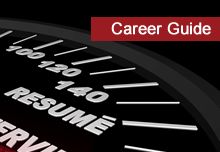Creating a CV
There’s no right or wrong way to set out a CV, but there are some standard sections that it should contain. These are:
Personal Details
Normally these would be your name, address, date of birth, telephone number and email.
Personal Profile/ Personal Statement
This is a short statement at the beginning of your CV to sell yourself, to show your skills, experience and personal qualities. You could include active words such as ‘developed’, ‘accomplished’, and ‘resolved’. Tailor the statement to the requirements of each job that you apply for. Make it clear to the employer that you’re the right person for the job.
Education and Qualifications
If your educational background is your strongest selling point then you should probably want your “Education” section to appear straight after your Personal Statement. (especially if you're a recent graduate)
If your work experience is stronger than your education (especially if you are a senior level candidate) it is advisable that the ‘Education' section features after your ‘Employment History' where you highlight your career achievements and experience.
What to include
List your qualifications in order of the most recent and most relevant first. List your University, location, your degree and give details on the title of your dissertation. Mention grades unless poor! If you have a PhD, give the full title. List information on relevant modules, dissertations or projects that prove you are capable of doing the job. However, be careful not to include too much information.
Work Experience/ Employment History
- When writing your work experience you should only include relevant jobs either in terms of skills, knowledge or experience to the job you are currently applying for.
- Start with your most recent work history and work backwards chronologically, listing the name of the employer, the company’s location, your job title, the dates you worked there and your responsibilities and achievements.
- Try to explain the gaps in your employment history. If there are months or years where you were without a job then make the reason clear on your CV. ( e.g.voluntary work, raised family, health reasons) No need to go into detail about your circumstances; interviewers will question you about this further if necessary.
- Use action verbs
What if I haven’t done the job before or have little work experience?
- You can still use previous work history to sell yourself even if you have done jobs which you feel are irrelevant. For example, working behind a bar or in a shop will have given you the chance to display leadership skills, team working experience, customer service skills or business development skills.
- If you have little work experience because you have been out of work due to personal or family reasons, then you can emphasize the personal skills and attributes that you have. Perhaps a hobby or charity work has given you the chance to show similar skills. Even working in a shop, bar or restaurant will involve working in a team, providing a quality service to customers, and managing time effectively. Don't mention the routine, (e.g. cleaning the tables, taking customer orders).
- Try to relate the skills to the job. A finance job will involve numeracy, analytical and problem solving skills whereas for a marketing role you would emphasize on persuading and negotiating skills.
Hobbies & Interests
These can support your application if your hobbies and leisure activities highlight responsibilities and skills that are relevant to the job you’re applying for. They give the recruiter a fuller and more complete picture of your personality.
- Keep this section short and to the point.
- Show a range of interests. Anything showing evidence of transferable skills such as team working, organizing, planning, persuading, negotiating etc.
- Avoid mentioning your political or religious affiliations
Skills
-
Languages (Begin with your mother tongue, if necessary)
- Language
- Spoken and written level (normally: Elementary, intermediate or advanced) Show if you read, write, or speak e.g. good conversational French, basic Spanish
-
Computing Knowledge
- Programming languages known or software used.
- Level of knowledge (professional or user) such as fluent, intermediate, or basic. “good working knowledge of MS Access and Excel, plus basic web page design skills"
Professional Training / Development:
List the specific courses that you have taken relevant to the job in hand or have either already obtained or are studying for a professional qualification. You may also include any qualifications and training from previous relevant jobs. You may mention either the period which you attended the courses, or the number of total hours attended.
References
Do not give the names and contact details of your referees on your CV. You should simply state that ‘References are available on request'. Employers will ask you for details if and when they are ready to offer you a position.
Should you be asked for references normally two referees are sufficient: one academic (perhaps your tutor or a project supervisor) and one from an employer.





